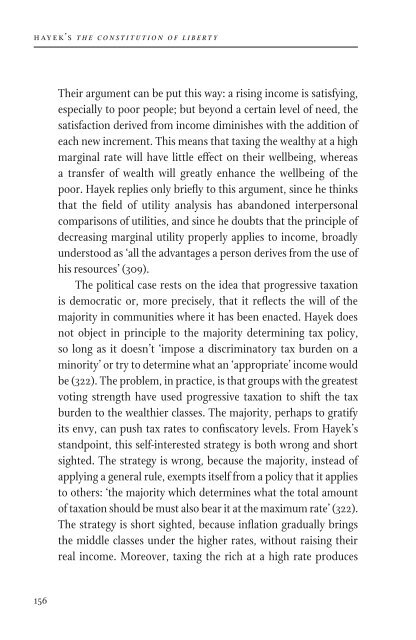Hayek's The Constitution of Liberty - Institute of Economic Affairs
Hayek's The Constitution of Liberty - Institute of Economic Affairs
Hayek's The Constitution of Liberty - Institute of Economic Affairs
You also want an ePaper? Increase the reach of your titles
YUMPU automatically turns print PDFs into web optimized ePapers that Google loves.
h ay e k ’ s t h e c o n s t i t u t i o n o f l i b e r t y<br />
s o c i a l s e c u r i t y, t a x a t i o n a n d t h e r e d i s t r i b u t i o n o f w e a lt h<br />
<strong>The</strong>ir argument can be put this way: a rising income is satisfying,<br />
especially to poor people; but beyond a certain level <strong>of</strong> need, the<br />
satisfaction derived from income diminishes with the addition <strong>of</strong><br />
each new increment. This means that taxing the wealthy at a high<br />
marginal rate will have little effect on their wellbeing, whereas<br />
a transfer <strong>of</strong> wealth will greatly enhance the wellbeing <strong>of</strong> the<br />
poor. Hayek replies only briefly to this argument, since he thinks<br />
that the field <strong>of</strong> utility analysis has abandoned interpersonal<br />
comparisons <strong>of</strong> utilities, and since he doubts that the principle <strong>of</strong><br />
decreasing marginal utility properly applies to income, broadly<br />
understood as ‘all the advantages a person derives from the use <strong>of</strong><br />
his resources’ (309).<br />
<strong>The</strong> political case rests on the idea that progressive taxation<br />
is democratic or, more precisely, that it reflects the will <strong>of</strong> the<br />
majority in communities where it has been enacted. Hayek does<br />
not object in principle to the majority determining tax policy,<br />
so long as it doesn’t ‘impose a discriminatory tax burden on a<br />
minority’ or try to determine what an ‘appropriate’ income would<br />
be (322). <strong>The</strong> problem, in practice, is that groups with the greatest<br />
voting strength have used progressive taxation to shift the tax<br />
burden to the wealthier classes. <strong>The</strong> majority, perhaps to gratify<br />
its envy, can push tax rates to confiscatory levels. From Hayek’s<br />
standpoint, this self-interested strategy is both wrong and short<br />
sighted. <strong>The</strong> strategy is wrong, because the majority, instead <strong>of</strong><br />
applying a general rule, exempts itself from a policy that it applies<br />
to others: ‘the majority which determines what the total amount<br />
<strong>of</strong> taxation should be must also bear it at the maximum rate’ (322).<br />
<strong>The</strong> strategy is short sighted, because inflation gradually brings<br />
the middle classes under the higher rates, without raising their<br />
real income. Moreover, taxing the rich at a high rate produces<br />
much less revenue than is generally recognised. Hayek estimates<br />
that British expenditures on subsidies and services are ‘financed<br />
mainly by the contributions <strong>of</strong> the middle and upper ranges <strong>of</strong> the<br />
middle class’ (313; cf. 311–13, 315).<br />
Progressive taxation is put forward as an expedient or advantageous<br />
policy, but Hayek contests this claim on economic<br />
grounds. One <strong>of</strong> his objections to high marginal tax rates is that<br />
they impede capital formation, thus slowing economic growth.<br />
Potential savers and investors are the ones hit hardest by high<br />
marginal tax rates, especially those persons who expend efforts<br />
over time or take risks that might yield large gains in a single<br />
year. Moreover, high marginal rates reduce the incentive for<br />
individuals to increase their earnings within a given tax year and,<br />
what is even more harmful, they misdirect resources by diverting<br />
people’s energies to less useful activities (316–18). To build up a<br />
new business or succeed in a new enterprise, individuals must<br />
control considerable resources; and acquiring a fortune in a<br />
short time period should be seen as ‘a legitimate form <strong>of</strong> remuneration’<br />
for this kind <strong>of</strong> activity. Discouraging individual capital<br />
formation restricts competition, inasmuch as it strengthens ‘the<br />
position <strong>of</strong> the established corporations against newcomers.’<br />
In effect, ‘the tax collector’ shelters old firms from competition.<br />
Also, by preventing ‘the dangerous newcomer from accumulating<br />
any capital,’ progressive taxation ‘checks economic progress and<br />
makes for rigidity’ (320–21; cf. 318–20).<br />
Progressive taxation has sometimes been justified on the basis<br />
<strong>of</strong> capacity to pay, but this argument was superseded by the claim<br />
that such a system produces ‘a more just distribution <strong>of</strong> income’<br />
(311). Hayek grants that justice is an appropriate standard for<br />
weighing tax systems, but argues that steeply progressive ones are<br />
156<br />
157












